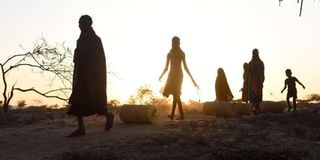Widows are part of the journey to gender equality

Lolio Ekal (left), a widow and other residents of Kodekode village in Turkana County look for water on February 7, 2022.
What you need to know:
- The first ever resolution on widows by the UN General Assembly since the formation of the UN Commission on the Status of Women was recently adopted, sending waves of hope to many widows across the world.
- Widows have remained socially stigmatised and deprived of respect and humanity despite the huge responsibilities on their backs, among them being the head and breadwinners of the family.
The first ever resolution on widows by the UN General Assembly since the formation of the United Nations Commission on the Status of Women (CSW) was recently adopted, sending waves of hope to many widows across the world.
According to the UN, widows account for about 258 million people globally; in Kenya, they are nearly eight million, comprising 15 per cent of the population.
However, despite this being a significant proportion of the population, widows were never mentioned in the Kenya Population and Housing Census reports until 2019.
Widows have remained socially stigmatised and deprived of respect and humanity despite the huge responsibilities on their backs, among them being the head and breadwinners of the family. Seven out of10 African widows are reported to be the heads of their families.
Climate change
Socioeconomic immobility is almost every widow’s way of life as they are challenged and faced with barriers that limit their future and that of their children. One out of seven widows live in extreme poverty, just below $1.25 a day.
But in what seems to be a beam of hope for widows, during the just-concluded CSW66—themed “Achieving gender equality and the empowerment of all women and girls in the context of climate change, environmental and disaster risk reduction policies and programmes”—the UN General Assembly adopted the “Addressing the Situation of Widows” resolution, thus calling for the international community to respond to the human rights, discrimination and violence that widows face.
The resolution seeks to ensure widows are internationally, regionally and nationally recognised, protected and respected at all levels of policy and development. Speaking at the CSW66, the Gender Cabinet secretary, Prof Margaret Kobia, said: “The resolution on addressing the situation of widows takes Kenya and the world one step closer to meeting gender equality.”
Exciting milestone
She described the resolution as an exciting milestone, adding that the government will continue supporting widows through policy and other pragmatic interventions in the spirit of leaving no one behind. That means widows will no longer remain invisible, unheard and unrecognised.
The resolution provides widows a secure foothold in society, expanding our broader struggle for gender equality. It also opens avenues for policies that support the abilities, talents, skills and voices of widows as leaders and change makers to be formulated, implemented and reviewed for positive social change and transformation on their wellbeing.
This is a perfect opportunity for the Ministry of Public Service, Gender, Senior Citizens and Special Programmes to partner and work with widows serving in and leading organisations in advancing the human rights of widows.
They should ensure that policies that address systemic inequalities are put in place, thus enabling widows to support themselves and that their rights are protected.
Ms Odhiambo is a communications associate at Nyanam International. [email protected].





